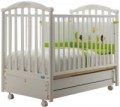Rocking mechanism
The type of mechanism that provides rocking of the crib (if any — many models
do not provide rocking).
—
Skids. Such cribs are equipped with curved skids, similar to those used in rocking chairs. Standing on such skids, the crib is capable of rocking. If such a crib is equipped with wheels, they are made removable — usually the crib stands on the skids, and the wheels are installed when it needs to be moved or fixed to prevent it from rocking.
Skids are the simplest and most reliable, but they also have their disadvantages: the baby turning in his sleep, will rock the crib, which can wake up himself; to fix the crib in a stable position, it is necessary to install wheels, which is very laborious and inconvenient. In addition, the skids are poorly combined with the floor, especially parquet and laminate, because they can damage it, and therefore put such cribs is best on carpeting.
—
Pendulum. In such models, the base is fixed on the floor, and the rest of the crib, thanks to special hinges, can rock. For a
longitudinal pendulum, the rocking goes along the crib, and for a
transverse pendulum — across. There are also
universal pendulums, the location of which is formed during assembly. Anyway, the pendulum mechanism has a lower risk of tipping if the baby
...starts to rock the bed, in addition, the pendulum, unlike the skids, does not affect the floor covering. On the other hand, the pendulum mechanism is more complicated and somewhat less reliable.Removable sidewall
Possibility to remove the sidewall of the crib.
The removable sidewall will come in handy when the baby is grown up enough to go to sleep and get up on his/her own and no longer needs fall protection. With the same purpose, such sidewalls are somewhat less convenient than opening sidewalls (see above), because the removed sidewall has to be stored somewhere. However, it is very difficult to equip a classic crib with an opening sidewall due to the lack of space, so removable ones have to be used.
Music box
It is known that babies fall asleep best to a lullaby, but in the modern world, parents do not always have the opportunity to give their baby enough attention. That's where a
music box is useful — it is a MP3 player built into the crib with an external speaker through which lullabies can be played. Melodies can be either pre-installed or downloaded at the request of parents.
Mattress
The size of the mattress in length and width in centimeters. The standard sizes of baby mattresses are 60x120, 70x120 and 70x140; you should pay attention to these sizes if you plan to buy a mattress separately from the crib.
The length of baby cribs varies from 90 to 140 cm, with 120 cm being the most common. The smaller size means that the crib will have to be changed sooner, and the longer lengths are usually convertible cribs (refer to "Type") designed not only for babies, but also for preschoolers and schoolchildren.
The width of the mattress can vary from 40 to
70 cm, and the most common option is
60 cm, this is considered quite enough. As in the case of length, a smaller width means that the baby will become cramped in it earlier, and usually convertible models have a larger width.
All of the above does not apply to cradles (refer to "Type") — they are designed only for the smallest and are much smaller.
Distance between rails
The distance between the rails on the side or end walls of the bed. A distance of 7-9 cm is considered optimal — this is not enough for a child to crawl between the rails, but enough so that a handle or leg does not get stuck between them.

